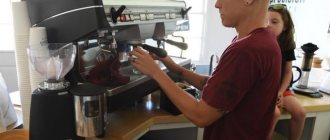Let's say you already know how to open a coffee shop: you have drawn up a business plan for a coffee shop, selected a concept, found a premises, chosen a program for a coffee shop and are thinking about purchasing the necessary equipment. It would seem that all the most difficult things have been completed, but this is only part of the trouble. It's time to recruit staff to get your coffee shop up and running. Even if you yourself want to stand behind the counter and operate the coffee machine, you will in any case need a shift worker, or better yet two. This means you need barista.
What should a barista know and be able to do?
An experienced barista must:
- distinguish different types of coffee beans;
- know under what conditions and where coffee grows;
- what methods are used when collecting and processing coffee beans;
- understand and know how to fry them;
- distinguish the aroma and taste of different types of coffee;
- Be sure to know the storage conditions for ground and bean coffee. Remember that in a room with high humidity, the taste of coffee beans changes dramatically;
- select the required grain grinding;
- be able to work with equipment for making coffee, be it a regular coffee maker or a professional coffee machine;
- know the technology and standards for preparing various coffee drinks.
And don't forget about service skills! After all, you need not only to prepare coffee, but also to serve it beautifully and correctly to the client, to explain what is special about this drink, how it differs from others on the coffee shop menu. Pay special attention to coffee etiquette and choose the appropriate utensils to serve the drink.
For example, espresso-based drinks can be decorated by drawing petals, flowers, a heart, etc. on the milk foam. Not all baristas have such skills. It will be a huge plus if you find a candidate who already knows how to do this.
Roles of a barista today
Almost four centuries later, the profession of barista still exists. But their work has also changed over time. Today, they must be professionals responsible for operating espresso machines and preparing coffee and other drinks besides.
If you walk into a coffee shop today and order an espresso, the barista will also prepare the drink. Even with modern and advanced machine models, there are still important techniques and practices that help improve the taste and aroma of the drink.
Although baristas today are no longer associated with “bartenders,” they can also prepare other drinks that contain alcohol.
Thus, baristas are professionals with a wide range of both technical and practical drinks.
Apart from drinks, he can develop new recipes as he has a deep knowledge of coffee for its taste and aroma and can thus create different combinations with the drink.
The barista is also skilled in the art of latte art, which is also called coffee art.
How much do looks and charisma matter to a barista?
Quite a common question that many novice restaurateurs and coffee shop owners ask themselves. We asked our clients to answer it.
“Of course, charisma and appearance are important factors, especially for us. There are two types of bars: contact (like ours) and non-contact (work through waiters and menus). We work without waiters, and all guests communicate directly with the barista, so he must look good and be charismatic. If there is no direct contact between the barista and the guests, then in this case appearance is not so important, but charisma is always a huge plus.”
Co-founder of the Three Beavers cafe Artem Sidyuk
“Appearance and temperament must correspond to the company's goals. In addition to coffee, we are passionate about gastronomy, and also music, art, design, style, and tattooing. Our team contains only people like us. The general field of interests shapes the choice of an employee who is able to convey our values to the guest.”
Owner of the Object Coffee coffee shop Fedor Logvin
Who is better to hire for this job: a girl or a guy? The question is quite controversial; a lot depends on your target audience and the location of the establishment. When hiring an employee, it is better to focus not on the gender of the candidate, but on his skills and experience, or indicate the conditions and wishes in the vacancy initially.
Male visitors, of course, will be more pleased to see a pretty girl behind the bar, but their other halves are unlikely to like such attention. Perhaps it will be easier for a beautiful girl to sell more expensive drinks to men, and the guy, in turn, will be able to maintain a male conversation, which will increase the number of drinks ordered. But in any case, all these options need to be tried, combining personnel changes in such a way as to use their maximum potential.
# Cover letter for bartender
It is very important to include a cover letter with your bartender resume. Its goal is to highlight its special knowledge and skills to excel over its competitors.
Hello ( write the name of the employer if known
)!
My name is ( enter your First and Last Name
)._________
I recently saw (write where you heard about the vacancy) an open vacancy for a bartender in a restaurant that your company offers.
For the last three years I have been studying the restaurant business and understanding how to contact guests and make their experience better.
The desire to improve myself and self-confidence have made me a valuable employee, and working in the elite club “DREAM” has given me valuable experience.
I spent a lot of time turning the cocktail experience into a fun show. Since childhood, I have been able to create a friendly atmosphere and support any conversation. I know how to cook a delicious drink and serve it beautifully, and in my company guests are never bored.
I will be happy to demonstrate my abilities during a personal meeting.
_________
Please contact me at:
First Name Last Name Phone Email Link to profile on social networks (optional)
Does a cover letter affect employment?
AffectsNo
Requirements for a barista when hiring
Poster also asked this question to his clients - coffee shop owners.
“We are developing three coffee projects: the Vremena Goda chain of coffee shops on wheels, the Take coffee to go coffee spot and the Object Coffee coffee shop. We recruit employees for mobile coffee shops without prior experience in coffee and train them using our own methods. Experience is required to work at Take coffee to go and Object Coffee, so we offer places to the best guys from our street project and also consider talented baristas from outside.”
Owner of the Object Coffee coffee shop Fedor Logvin
“We expect friendliness and a love of coffee and people from a candidate. Work experience is welcome."
Co-founder of the Three Beavers cafe Artem Sidyuk
The ideal option is to gather a team of like-minded people. This is not easy to do due to the frequent changes of personnel in such establishments, but this is something that must be strived for.
Teachers and curricula
The pace of development of the coffee industry has accelerated so much that over the past 7 years we have learned more about coffee than in the previous 500 years of humanity’s acquaintance with this product. We can say that the “golden age” has come: coffee has never been as tasty as it is now. The audience is interested in alternatives, barista championships have reached a professional level, experiments with varieties on plantations no longer seem like something fantastic. The presence of very specific knowledge about growing coffee, skills in preparing drinks and their competent use have become criteria for selecting baristas when hiring.
In 2014, there were only 2 coffee trainers in Russia who had certificates from the international organization SCA (Specialty Coffee Association), which unites professionals in more than 100 countries. Now there are more professional teachers, there are already about 20 of them. Several training centers certified by SCA have appeared. As for proprietary “coffee” programs, this is usually a lottery: even if you trust the trainer, or he has good reviews, there is no guarantee that his knowledge and sources are up-to-date. A common problem is that self-taught teachers strive to earn more money without thinking much about the quality of the courses they offer.
When baristas trained in educational programs of varying degrees of professionalism begin to work in the same team, the main difficulty here is a conflict of backgrounds. This is normal, and over time, more advanced specialists can partially train those with superficial knowledge, and the joint work will continue. In the worst case scenario, people will not work well together and will disperse, so we recommend training all baristas in the team using a single program that has proven itself in the industry.
Where to look for a barista?
Start by posting ads on online job search resources. There is no point in advertising in the newspaper; you will most likely get an untargeted audience. The Internet will completely provide you with a stream of candidates. The profession is now quite popular among young people, so there will be a lot of calls regarding your ad. The main thing is not to compromise and look for the most suitable person for your team.
Many people consider relatives and friends as an alternative option. In European practice, this is a very common case, where a small establishment is owned by one family and serves it on its own. But for our coffee shop market, this could backfire. If you are really confident in the person, you can try, but keep in mind that you need to treat him as your employee, and not as a business partner. Don’t make concessions and don’t let them “get on your head.”
It doesn’t matter whether you are preparing to launch a classic coffee shop or to open a takeaway coffee shop - the search for employees can be carried out simultaneously with the selection of the necessary equipment for the coffee shop, so as not to leave it until the very last moment. Since the search for suitable candidates may take a much longer period than you originally expected. Do not forget that before worthy applicants appear, you must clearly distribute responsibilities, draw up a work schedule, establish a salary level and a bonus system to motivate staff.
Pros and cons of the profession
People planning to become a barista should first learn the pros and cons of the job. Among the positive aspects are the following:
- For true coffee lovers, this is a chance to develop in their favorite field.
- Meet new people. Regular customers often become true friends.
- Creative self-realization. The master invents new cocktails, experiments by combining different varieties.
- Flexible schedule. It is possible to combine work and study.
- There is no threat of unemployment. People drink coffee in all corners of the globe, and coffee brewers are always valued.
- Favorite drinks always available.
Among the disadvantages of this specialty are the following aspects:
- Relatively low wages.
- Constant communication with people. Stress and conflicts are possible.
- As a rule, young people are hired. It is extremely rare that employment is considered in the long term.
- During the working day, the craftsmen get very tired. At the same time, they need to be friendly and smiling all the time.
- Possible irregular work schedule.
What skills do beginner baristas most often lack?
“At the beginning of a career, few people realize how deep the world of coffee is. How important is a serious approach to detail for us and for our guests: the weight of dry grain and the finished drink, the degree of grinding, preparation time, maintaining the cleanliness of the workplace, service. There are no small things in coffee! I am glad that in the last year or two, coffee culture has become increasingly popular in Ukraine. We are approached by many more applicants who are already passionate about coffee and understand what they have to work with and at what level they have to understand the product in order to meet market demands.”
Owner of the Object Coffee coffee shop Fedor Logvin
“First of all, knowledge about both coffee and service. Well, it often happens that self-confidence is a consequence of the first.”
Co-founder of the Three Beavers cafe Artem Sidyuk
Place of work
A barista can work in a coffee shop, restaurant, pastry shop, bar and any other catering establishment. Professionals who have reached a high level of skill try to open their points over time. This allows them to work for themselves, not to adapt to the requirements of the manager, and to independently form the menu and policy of the establishment. Mobile barista-type catering services are becoming increasingly popular. An employee travels to the site of any event, bringing with him mobile equipment and ingredients, where he fulfills the orders of guests.
Is it worth hiring an inexperienced barista?
This question is often asked by novice coffee shop owners, and the answer will be of interest to those who want to try themselves as a barista.
“At the beginning of our establishment, we did not practice this format, but quite recently we hired one guy who had never had serious experience with coffee before. As a result, after almost two months of hard work and training, he is already on our staff, working at the counter.”
Co-founder of the Three Beavers cafe Artem Sidyuk
“We are ready to attract guys with no experience with coffee to work in the Vremena Goda chain of mobile coffee shops.” Since the street format implies a greater emphasis on service than on product, this is an excellent platform for entering a profession where training and career development are combined with intensive practice.”
Owner of the Object Coffee coffee shop Fedor Logvin
What to do if you have no work experience
Don't despair if you're just starting out in your career. Tell us about any customer service experience you have. Perhaps you worked as a waiter in a cafe or as a bartender, worked in a pastry shop or sold food - this experience will undoubtedly be useful for a barista.
If you're applying for a job for the first time, focus on what you learned in your barista course.
: carefully select the ingredients, whip the milk into the perfect foam, use the Latte art technique. Tell us what signature drinks you are ready to offer to clients and how you will be useful in the proposed position.
Additional barista training
Perhaps one of the most important points for improving the quality of service and sales of your coffee shop. The quality of service should improve so that your customers can be surprised every time by new recipes, methods of roasting beans and serving drinks.
How do coffee business professionals feel about this issue?
“Training is an integral part of developing a career in coffee. Mobile coffee shop staff undergo preliminary training before starting work; the course lasts only five days. Our teaching methodology allows us to teach children the basics of making espresso coffee during this time. These skills are enough to start working at non-busy points of sale. With practice comes experience, which we reinforce with internal trainings at the Object Coffee coffee shop. Baristas at Take coffee to go and Object Coffee have advanced qualifications, which allows them to conduct training for mobile coffee shop staff. In turn, we contribute to their own development by sending them to courses and trainings with leading specialists from Ukraine and abroad. Depending on personal interest and company goals, baristas attend external educational events in various coffee disciplines.”
Owner of the Object Coffee coffee shop Fedor Logvin
“Before going to work, each applicant undergoes training at the Pound of Coffee roasting facility. In the future, of course, we only encourage self-development, participation in championships and master classes, since this is a new certificate every time, and skills improve the quality of service in our establishments.”
Co-founder of the Three Beavers cafe Artem Sidyuk
Other specialties in the coffee segment
In addition to the barista, there are other functions and specialties in the coffee segment:
- Coffee sorter: professional in classifying coffee based on defects found in a sample of beans;
- Coffee Artist: Specializes in creating shapes and designs in coffee cups, resulting in true works of art;
- Coffee Hunter: professionals seeking exotic and special, high-quality coffees: includes geographical, physical, chemical and biochemical aspects, from the drying process to the moment of roasting;
- Coffee consultant: those who provide advice to cafes, helping from choosing a location to open a coffee shop to choosing professionals, equipment, suppliers and good coffee, not to mention the economic details of the business;
- Master Roaster: One who can analyze and select green coffee and continue the roasting process at the appropriate temperature, time, air flow and drum rotation to enhance the sensory characteristics of the coffee;
- Speakers: those who give lectures and conduct trainings about the coffee universe;
- Coffee taster: responsible for analyzing the quality of coffee lots for the domestic market or for sale on the exchange;
- Q-Grader: A “Q Assessor” is a professional holder of a worldwide certification granted to coffee graders and tasters affiliated with the Coffee Quality Institute in the USA. The certificate is issued after completing the course and a series of exams.
It is a fact that the market is demanding more and more from professionals, and baristas have delved into all the above-mentioned activities, and sometimes several at the same time. The best professionals dominate and know the entire process.
Actually an interesting fact: the profession of barista was recognized only in Brazil and was included in the Brazilian Classification of Occupations in 2013, and in 2015 it was regulated by the CTASP (Commission of Labour, Administration and Public Service).
For this reason, to become a professional barista in this country, you must have completed high school, be over 18 years of age, and have completed a specialized course in the field.
Summary
Don’t be afraid to hire newcomers, especially if you see that the person will join your team. But if you are just starting a business, you will need at least a couple of more experienced baristas to show the beginner the basics of coffee making. Constantly improve the skills of your baristas, pay for part of the training or master classes at the expense of the company. Attend trade shows and stay on top of trends to keep up with competitors and educate employees about coffee culture. The market for mobile and small coffee shops is now one of the most actively developing, so competition here is very strong, despite the constant demand. If you want to learn more about how to choose the right barista, we recommend our How to Open a Coffee Shop course.
Professional barista assistants
The main assistant of the master is his inventory. In addition to the coffee machine, the following equipment is used:
- holder - a horn into which a filter is inserted and coffee powder is poured;
- tamper - intended for tamping (tempering) ground grains;
- pitcher is a special container in which milk is heated and whipped; it is also used when applying patterns to the foam;
- A grinder is a coffee grinder.
Pitcher
Holder
Grinder
The barista profession is interesting and educational, especially for true coffee connoisseurs. Anyone can become a coffee master. To do this, you just need to not be afraid of experiments and constantly improve.
What to choose when there is an alternative?
The profession has nothing to do with gender; there are no prohibitions, additional privileges or strict restrictions according to this criterion. But most often you will come across a girl in the role of a barista. For a young lady, this is not the worst option; if you are lucky, you will be able to do only coffee, freeing up part of your working time for rest and entertainment. After all, among the alternatives, work:
- Bartender.
- Waiter.
- Dishwasher.
- Cook.
- Hostess.
You can get a job in all of the listed positions without special education, with the exception of a cook, of course. And there is not much difference in salary, again with the exception of a dishwasher. But the level of workload and work schedule can differ significantly.
So why bother and spend more of your time if in the end the income will be at the same level? The average period of work in one place rarely exceeds a year, and staff turnover is high. What can we say, if not every coffee shop manages to exist for more than one year.
Interview at Coffee Like
A popular chain of coffee shops in Nizhny Novgorod, there are about 10 outlets in the city, or coffee bars, as the workers themselves call them. Coffee bars are mainly represented by islands in shopping centers and kiosks. The next day after filling out the form on the organization’s website, the manager, Marina, wrote to me on VK and invited me for an interview.
Before the interview, I went to one of the Coffee Like kiosks and grabbed a cappuccino. There were two barista girls behind the counter, both polite, one of the girls, as I understood, was a trainee. Coffee “like everywhere else.”
The company's office is located in the city center, in one of the business centers. The premises consist of a room with a coffee machine, around which training takes place. A partition separates a small area for the manager's office. The interview did not last long, the only questions were: “Tell me about yourself” and “whether you like working in such and such a shopping center.” After I said that I worked for 5 years as an engineer, the manager widened her eyes and didn’t really believe that I just decided to change my field of activity. Now I understand that a better legend was needed, the information would hardly have been checked anyway, but I never could have imagined that getting a job as a barista would be so difficult.
The training conditions there are good: 5 days of training in the office, then 2-3 weeks of internship in different coffee shops. Payment for internship: 70 rubles. per hour, but they will only pay you if you complete an internship.
In the evening, the manager wrote to me and said that they had given preference to another candidate. Know, Marina, I didn’t really like you either.
A little historical background on the profession.
The word came to us from the West, as you might have guessed, derived from the Italian word barista
. But even there it can be called relatively new; no one had heard of these specialists back in the first half of the last century. So, is a barista a highly qualified worker, with a special education, focused on high technology?
This is not entirely true; the emergence of a new profession is associated with the introduction of coffee machines into everyday life.
The invention quickly gained its audience and appeared in almost all coffee shops. But to service the drug, people are needed who can handle it and who can get the drink ordered by the client in a few minutes.
The machines themselves sharply reduced the cost of coffee, thanks to which any establishment could boast a wide assortment and modest prices:
- Latte.
- Americano.
- Cappuccino.
- Espresso.
- Glyase.
Now you can get a cup of excellent coffee without leaving the counter; in just a few minutes, a smiling barista will prepare and serve it to you in the best possible way.
How much does a barista earn?
What about wages in general? For us, everything depends on the region, the prestige of the establishment and the number of shifts. The salary is commensurate with the salary of a bartender; the responsibilities in some establishments also have very much in common with this particular specialist. In the periphery they usually pay the same as the regional average, sometimes a little less. But in large cities you can find a really profitable place.
The average salary ranges from 15 thousand rubles. up to 35 tr. It all depends on the work schedule and level of the establishment.
But there the requirements will be more stringent:
- There is no need to wash dishes or stand at the cash register.
- But the depth of knowledge can be checked.
- We are talking not only about knowledge in terms of taste, variety name and cooking options.
- They may well require historical information to make it more interesting for visitors.
- Geographical knowledge will also tell you in which countries coffee is grown, and how the quality of the final product depends on width and longitude.











